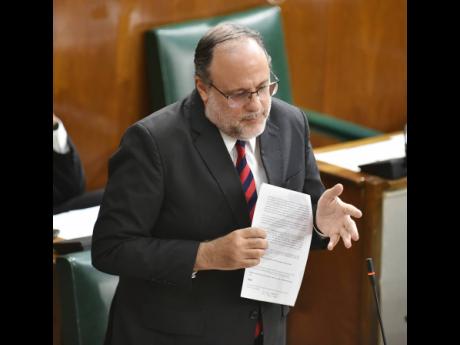Integrity Commission accepts proposal for shadow cabinet to sign code of conduct
A recommendation by the Opposition Leader Mark Golding for members of his shadow cabinet to sign the leadership code of conduct prepared by the Integrity Commission (IC) has been accepted by the anti-corruption body.
Golding submitted to the commission on Sunday, January 8, a revised, signed and undated version of the leadership document.
The opposition leader’s proposed adjustments were primarily in keeping with a request which he asked the commission to consider.
Golding suggested that “the members of the shadow cabinet each be given the opportunity to sign to these leadership commitments, rather than me doing it for them”.
The board of commissioners of the Integrity Commission on Monday considered and approved the adjustments.
IC Executive Director Greg Christie told The Gleaner that the chairman of the anti-corruption body, Justice (Ret’d) Seymour Panton, will now countersign and date the document, after which a copy will be returned to Golding.
“The commission has asked the opposition leader, through the utility of his good offices, to encourage the members of his shadow cabinet, opposition members of parliament and opposition senators to follow suit and subscribe to the referenced leadership code of conduct as he has done,” said Christie.
Christie said he sent a letter to Golding on Monday, formally advising him of the commission’s decisions.
He also noted that the leadership code of conduct was first sent to the Opposition leader on November 15, 2022 and acknowledged on that day as received.
Meanwhile, the commission said it has not received a response from Prime Minister Andrew Holness to its November 15, 2022 letter to which the leadership commitment document was attached for his review, subscription and signature.
Last Thursday, National Integrity Action Principal Director Professor Emeritus Trevor Munroe urged Holness and Golding to promptly sign the proposed code of conduct.
Among other principles, the code commits each leader to honesty, accountability, and openness in fulfilling their public duties.
“At a time when leaders in all sectors are called on to set an example – in word and deeds – in raising rapidly declining standards of public behaviour, further delay in our political leaders’ commitment to adhere to ethical behaviour is unacceptable,” Munroe said.
The leadership code of conduct contains seven principles of public life. The first, selflessness, urges holders of public office to act solely in terms of the public interest.
“They should not do so in order to gain financial or other material benefits for themselves, their family, or friends,” the code added.
Another principle states that the “holders of public office should not place themselves under any financial or other obligation to individuals or organisations that might seek to encourage improper behaviour in the performance of their official duties”.
A third principle highlighted by the commission is honesty.
“Holders of public office have a duty to declare any private interests relating to their public duties and to take steps to resolve any conflicts arising in a way that protects the public interest,” it proposed.
The other principles are objectivity, accountability, openness, and leadership.
The IC is mandated and empowered by law to develop codes of conduct for public bodies and public officials.
Section 6(1)(g) of the Integrity Commission Act states that it is a function of the commission “to prepare codes of conduct and other advisory material relating to corruption”.

